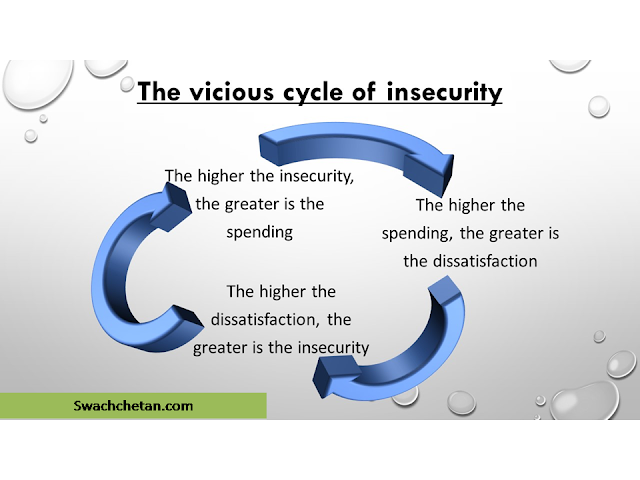CHOOSING NEEDS, WANTS, AND ASPIRATIONS
Most people
use these words interchangeably. However, there are major differences when it
comes to practicing and implementing them toward reaching one’s goal.
There is a
basic difference between what we want and what we need. As one of my Mantras
says,
"What we want is not what we want, what we want is what others want us to want.”
Want is
something we can do without. The need is something we can't do without. We will not
survive without needs. For instance, consider the need for oxygen. You will
never say, “I want oxygen.” You always need it. One minute without it, we will
start panicking. Suppose somebody says “Don't breathe for a few minutes”,
however much the other individual is important to us we will refuse to do it. The
need for oxygen, need for food, need for water, are all basic needs. But what
you eat, how you eat, where you eat, what you drink, etc. are all controlled by
wants.
The
description of the motivational cycle and how dissatisfaction with one’s needs
and wants leads to distress has been explained elsewhere. (See Types
of Distress and how to overcome them?)
Needs are
necessities of life that are essential for survival. It may be physiological
needs like food, water, clothing, shelter, and sleep. Or psychological needs
like security, safety, well-being, love, and education. Or social needs like
friends, family, work, and community.
On the
other hand, wants are how, where, and when these needs are
fulfilled. They may not be essential for survival but are required to thrive in
the environment.
Aspirations are
desires that involve the fulfillment of several needs and wants.
The connection
between needs, wants, and aspirations
For
simplicity, let us see how these three are connected.
Let us say
your house is 10 kilometers away from your place of work.
You need
a vehicle to commute every day. (The vehicle could be a cycle, bus, train, cab,
etc.)
You want
to buy a motorcycle or scooter.
You aspire
to own a car.
Aspiring to
buy a car
When we
aspire for something, several wants and needs accompany them. For instance, let
us say, you have the desire to buy a car. However, the moment you aspire to buy
a car, you will not be able to buy it! You must arrange for the money and other
requirements.
How much
money depends on several things and you should answer several questions like
what price, which brand, how much horsepower, what color, driving comfort,
seating capacity, etc. The more questions you have, the more will be your
choices. Each of these choices will have
several wants and needs that should be satisfied. (For the kind of questions we
ask, see ‘E = MC2 in
Psychology’
Suppose it
takes six months for you to arrange for the money, you must have to cater to
the basic needs like food, water, clothing, and sleep every day, you have to
look after your family every day, and you must work every day. The money you
arrange to buy a car should be over and above these expenses and once you buy
the car, these expenses will not stop. They will continue to be there.
Importance
of Motives
Superficially
it appears that aspirations guide the wants and needs of the individual.
However, aspirations can enter the arena only when needs and wants are
fulfilled. Let us say the individual needs sleep. Night shift workers,
night-time drivers, and other professionals who work round the clock, when
deprived of sleep, are ready to exchange anything for a few minutes of sleep.
(For details on how sleep deprivation affects normal functioning, see ‘The Sleep Probe’).
Similarly,
in the case of oxygen, water, food, etc., deprivation will turn off all other
wants and aspirations. Threats to safety, insecurity, unemployment, poverty,
financial loss, etc. can also be a hindrance to opting for wants and needs.
Wants arise
only after there is a certainty that the need is fulfilled. The stronger the
certainty, the greater the number of wants. For instance, when you are sure of
a meal throughout your life, you can think of cutlery, dining table, cooking
utensils, partying, etc.
Aspirations
enter once the wants are fulfilled. Dining in a five-star restaurant or dining
with a celebrity can be thought about only when there is sufficient proof that
you can afford it.
For
example, only when you are assured of sleeping every day (need), can you think
of a place to sleep, a bed, a cot, a cover, an air cooler, an air-conditioning,
etc (wants). Once these wants are fulfilled, you may desire to buy a house
with a well-furnished bedroom (aspiration).
Thus, as
far as importance is concerned, let us match it up to a building, where the
need is the foundation, wants are the pillars, and aspiration is the roof. This
is depicted in the picture below.
The
Multiplicity of Goals
The number
of goals increases as you proceed from a need to an aspiration. For instance, your only goal is to procure employment if you are unemployed. You will be
ready to take up any job that comes your way. Once you get a job, you will
start thinking of salary, perks, working conditions, etc., and you will have
plenty of goals. Once these are fulfilled you may aspire to work in a
multinational company or own a company, etc., where the number of goals will
be infinite.
This
relationship is depicted in the graph below.
Reducing
Goals
The higher
the number of wants the greater will be the number of goals. The greater the
number of goals, the higher the distress of the individual. This is because not
all goals can be fulfilled, and this leads to several types of
distress.
If you don’t want unnecessary distress, you must reduce the number of wants. One of my mantras says,
Luxury makes us Lazy
Comfort makes us Careless
Necessity makes us Energetic
So, if you want to be energetic, willing, and passionate, make your ‘want’ a need. If you fulfill your needs, you will always be happy; when you fulfill your wants, you will always be unhappy.
The
solution here is to measure your activity. If you feel lazy trying to do
something, then you can try to increase the necessity. If you are careless
either in your thoughts or in your actions, then once again, try to increase
the necessity.
The urge
should come from within you and you must seek to do things.
The Vicious Cycle of Insecurity
We feel
that when we spend more we will get better quality. Here, by opting for greater
quality, we are choosing to fulfill our wants rather than our needs. The more
we give importance to our wants the more we are insecure.
Things are
made attractive to you so that your wants and your confusion will increase. The
more you go in for attraction, the greater will be the dissatisfaction.
We need to
prioritize our value system. What we need should get the highest priority
followed by want is essential. We can always skip what others want.
The
Dangerous Conversion
Sometimes,
people overdo things. They try to convert their wants and aspirations into
needs. For example, drinking too many cups of coffee or tea may not be a
physiological need at all but a habit picked up over a while that has led to a
physical craving.
Almost all
addictions start as a want and gradually they become needs. People feel they
are unable to live without them. A girl commits suicide because her mother told
her she would get her a mobile a bit later as she has no money right then. A boy
commits suicide when he is denied playing online games (See ‘Helping
youngsters to overcome digital dependency’).
Some people
go to the extent of converting aspirations into needs. They say, “What is the
use in living when I am not a millionaire?”
The
solution is to keep verifying wants and aspirations and keep evaluating the
level of satisfaction.
In brief,
Choose as many needs as you can – all these lead to your primary goals
Choose less number of wants – all these lead to your secondary goals
Choose realistic aspirations – all these lead to your tertiary goals
To
summarize, needs are essential for survival. Once the needs (physiological,
psychological, and social) are fulfilled, we opt for wants. The number of wants
keeps increasing day by day, and the level of satisfaction keeps decreasing.
This is when we go in for aspiration, thinking that if we achieve that, all our
problems will be solved. However, unrealistic aspirations lead to greater
psychological and financial problems. So, we must become wiser by reducing our
goals, keeping away from the vicious cycle of insecurity, and avoiding
converting wants and aspirations into needs.
If you
would like to know how to be realistic in your aspirations, see ‘Aspiration
and Achievement’.
Are we misguiding everyone about goal-setting?

















Please do not include any spam links in the comment box.